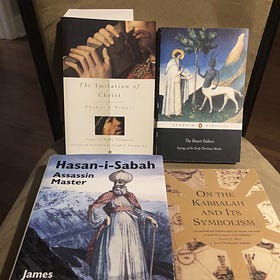Judeo-Christian Mysticism Vs. Pauline-Christian Paganism
Worshipping Jesus vs. idolizing imaginary images
I deeply appreciate the support our readers offered me last month following the publication of an essay in which I described the return of my PTSD symptoms at more intense levels and the impact of the disease in intensifying my sense of empathy to the point where I even feel bad for deeply evil people such as antisemites.
You write: "I’m goin to return again and again to my Judeo-Christian call to love others, to pray for those who persecute you." It is not "Judeo-Christian" but purely Christian. Firstly, Jews are not instructed to love others but to treat them fairly -- you can instruct others to behave in certain ways but not to feel certain ways. Feelings are. They just are. The point is how one behaves regardless of how one feels.
Secondly, we do not pray for those who persecute us. Similarly, we do not have to forgive. For the Jew to forgive there are three conditions that must be met and the first is that the perpetrator apologizes in a sincere manner. I think Christians pray for the perpetrate to recognize his or her sins and accept Jesus, no? Correct me if I am wrong.
When I write “Judeo-Christian,” what am I actually talking about?
And further, when I regularly identify as a “Judeo-Christian mystic,” what does that mean?
Let’s take these one at a time.
My Subjective Definition of “Judeo-Christian”
Now, when people use the term “Judeo-Christian,” it can certainly mean different things. In one sense, it’s simply a synonym for “Biblical.” The speaker is emphasizing that “Judeo-Christian” moral values encompasses concepts from both Old and New Testaments. I often see it used in a political context, too, as a rhetorical tool used to avoid alienating Jews and other non-Christians in the conservative movement’s objectives, an attempt to “widen the tent.”
My use of the term is admittedly more obscure and eccentric, as one could fairly characterize most of my views about religion.
Perhaps my preference for identifying with the term could be better understood by making clear how this approach differs from others that fall purely in the Christian tradition.
How is “Judeo-Christianity” different from “Pauline-Christianity”?
Or, in other words, when one reads the four canonical gospels, is it more important to understand them through going backwards in the Bible or forward?
Which is ultimately more foundational in the Christian’s faith: the Tanakh (the Jewish term for what Christians call the Old Testament) or the letters of the Apostle Paul?
Put in further practical terms, should Christianity understand itself as an extension of and variation of Jewish religion? Or should it be understood as an outright rejection of its Jewish roots, existing and distinguishing itself as a totally distinct, different religion?
Longtime readers of this Substack and my work in the years before creating this publishing company shouldn’t have a hard time guessing on which side of this argument I fall.
In my subjective analysis of what little we really know about the historical Jesus, I don’t think that Jesus was rejecting Judaism or trying to start a new religion based in such a rejection. It seems to me that Jesus simply emerged out of a different current of ancient Israelite religion than the one that gave birth to modern-day Jews.
The thesis that there are three basic groups of Jews in the Second Temple period is well-accepted: Sadducees, Pharisees, and Essenes.
Modern-day “rabbinic Judaism” comes from this Pharisee line. My tentative conclusion—and I’d be happy to find compelling evidence proving me wrong on this—is that Jesus, John the Baptist, and the early Christians essentially come from this Essene tradition.
Now, while the differences between the Pharisees and Essenes are very significant, their similarities and common roots are much more important. These are different kinds of Jews, to be sure, but they’re all still Jews.
For example, the theology of The Book of Enoch—which I have studied for years and have even made the basis for the fiction project I’m working on now—seems to be related to the Essenes. It also appears to have exerted an influence on early Christianity. The New Testament references its ideas and even quotes from it directly:
“Enoch, the seventh from Adam, prophesied about them: ‘See, the Lord is coming with thousands upon thousands of his holy ones to judge everyone, and to convict all of them of all the ungodly acts they have committed in their ungodliness, and of all the defiant words ungodly sinners have spoken against him.’” Jude 1:14-15 (NIV)
But The Book of Enoch is essentially an outgrowth from the Torah. It builds on foundational Jewish principles, but then just interprets them in a different way than other contemporary Jewish groups. It is a branch extending from the tree of the Torah. And it is impossible to really make sense of it without a deep understanding of the Hebrew Bible.
However, the Apostle Paul disagrees. In Paul’s letters, Judaism is clearly rejected and its practices said to be no longer important. In a Paul-centric form of the faith, all that really matters is believing Jesus is God, and accepting Him as your Savior. This is a distinctly new religion. Rather than “the religion of Jesus,” it is the “the religion about Jesus.”
And it's those two tiny prepositions that change everything. Biblical scholar Bart Ehrman explains the difference here:
OK, is that clear enough?
The Judeo-Christian regards his religion as a branch extending from the Jewish tree.
But the Pauline-Christian sees the Jewish tree as essentially needing to be burnt down entirely because, just like all other religions, it is a lie. And believing in it will result in the all-loving God sending you to hell to be tortured for eternity.
And—spoiler alert—it was this latter tradition which became “orthodox Christianity”: the state religion of European nations and empires for most of the last 1600 years, starting with the Roman emperor Constantine’s conversion in 337.
Thus, I have no problem acknowledging that to most devout Christians today, my approach would be regarded as a “heresy.” So be it.
Now, jumping forward to the present day, what are the implications of these differences?
Judeo-Christian Mysticism vs. Pauline-Christian Paganism
The reasons for my rejection of “orthodox Christianity” and the Paul-centric Christian tradition can be boiled down into one sentence:
In rejecting the Jewish tradition, one rejects the wisdom the Jewish people have assembled for thousands of years, and—most importantly—one loses the Jewish understanding of humanity’s greatest problem: idolatry.
I’ve said it before and I’m going to keep saying it: most Christians today are pagan idolaters and don’t realize it. Most Christians today are not actively worshipping Jesus. If they were, then they would behave and become much more like Him, because that is what worship does: It motivates one to take on the qualities of whatever one worships.
Instead, they are idolizing images of Jesus in their head, doing so for the same reason why all people idolize anything or anyone: to fucking feel good. Going to church isn’t really about trying to learn how to be “Just Like Jesus” and to perpetually ask, “What Would Jesus Do?” It’s about going to have a good time and to feel like one is a good person through coming to a building each week, putting on fancy clothes, singing happy songs, shaking hands with friends, putting a few dollars in the collection plate, eating donuts, and hearing some “sermon” which is usually just pop psychology or political pep talks—if not outright bigotry—from behind the pulpit.
The dangerous images of God are those that we make not out of wood and stone but out of ideas and concepts. You see, an idea is abstract. So Saint Thomas Aquinas, for example, defined God as necessary being he who is necessarily. Now that is a philosophical concept. God is being but that concept is an idol because it confuses God with an idea. And because an idea is abstract it seems something very much more spiritual than an image made of wood or stone and that's just precisely where it becomes deceptive.
Likewise many people think that the Bible is the authentic word of God and therefore they worship the Bible and make it into an idol disregarding the ironical remark of Jesus to his contemporary Jews: you search the scriptures daily for in them you think you have life, and as St Paul said later, the letter kills but the spirit gives life. And so whatever you put as an image or an idea in the place of God necessarily falsifies God.
And so what is the alternative to making ideas about God and images of gods?
When I advocate for mysticism, I’m doing so by the basic, conventional definition of the term according to Merriam-Webster:
God is not found in churches.
God is not found in dogmas and theology.
God is not found in English translations of ancient texts.
All of these merely hint at where to really find God.
To truly discover our God, the Creator of All, the only True God amongst the idols, direct experience is the only way to truly begin to come close to comprehending that which is beyond comprehension. And to gain that, one must engage in rituals, practices, and activities that run from East to West, from across all religious traditions.
And I’ll be talking about that more soon. I'll explain which mystical practices have worked best for me, especially as I’ve come to utilize them as a treatment for my PTSD.
For now, though, heres’s a question to consider and to please share your thoughts on in the comments: what do you do to achieve union with the Divine?










Very interesting. As someone who was raised Lutheran (very, very into Paul, those Lutherans) and became a Unitarian in my 30s, I know parts of this story from a different angle. Those parts ring true, especially since non-Trinitarians were booted from Christianity by the Council of Nicea.
Thanks for this, David. I largely agree with your observations about idolatry and, in contrast, the better way which is to live the values in one’s everyday affairs.